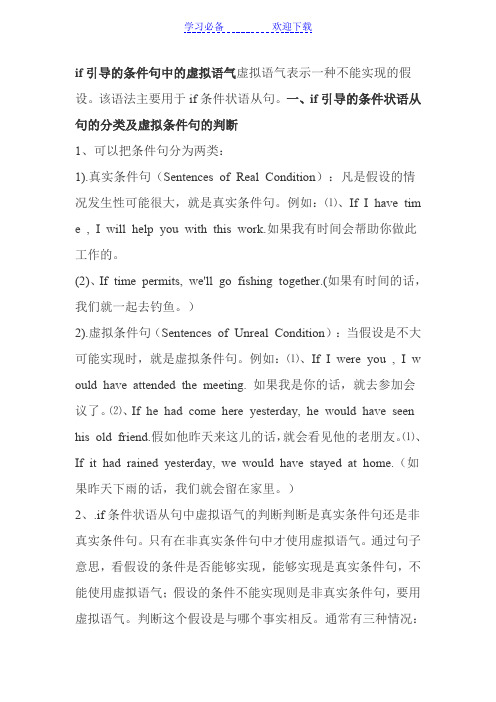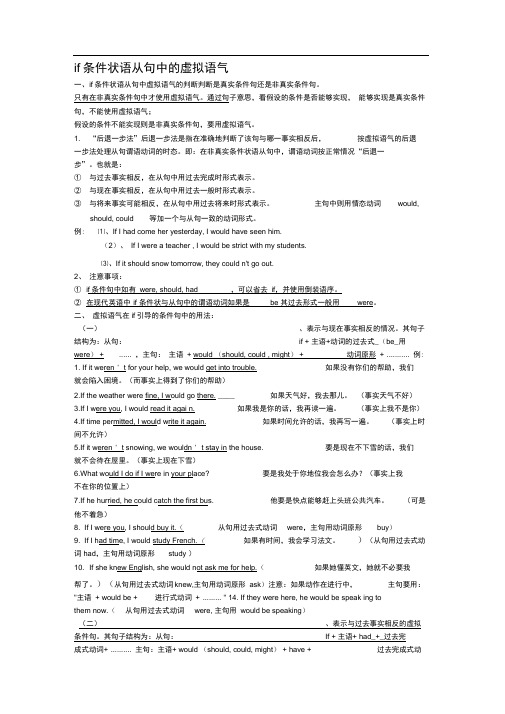if引导的虚拟语气
虚拟语气

If it snowed/were to snow/should snow tomorrow,we could change our plan.
如果明天下雪,我们会改变计划。
将来
二、虚拟语气的倒装形式
1)If it had not been for your help,we would never have been able to get out of trouble. → Had it not been for your help,we would never have been able to get out of trouble. 2)If it should snow tomorrow,we would put off our trip. → Should it snow tomorrow,we would put off our trip. 3)If I were you,I would buy that car. → Were I you,I would buy that car.
他立刻去老师的办公室很有必要。
增:
现在的事实 If it were not for the fact that you are ill,I would ask you to do this right now.
如果不是你病了,我会让你立刻做这件事。
If he had followed my advice,he wouldn’t 过去 have lost his job.
如果他听了我建议,他不会失去他的 工作。
情况3:与将来事实相反
If sb. did/were to do/should do …,sb. would/could/might do.
(完整版)if引导的非真实性条件状语从句即虚拟语气

if 引导的非真实性条件状语从句即虚拟语气通过动词形式的变化来表示说话人对发生的动作或存在的状态所持的态度或看法的动词形式称为语气。
.英语中的语气分三种:陈述语气、祈使语气、虚拟语气。
虚拟语气表示说话人所说的话不是事实,而是一种祝愿,建议,与事实相反的假设或实际可能性不大的情况等(即非真实的假设)。
If 引导的条件状语从句分为真实和非真实条件句(虚拟条件句)。
真实条件句表示在假设的条件下,有可能实现的情况。
非真实条件句表示的是假设的或实际可能性不大的情况,故采用虚拟语气。
If he does n’t hurry up, he will miss the bus.( 真实条件状语)If he was free, he asked me to tell stories.(真实条件状语)If I were you, I would go at once.(非真实条件状语从句)If there was no air, people would die.(非真实条件状语从句)1)非真实条件句中虚拟语气的基本形式。
假设类型条件从句的动词结果主句的动词与现在事实相反动词过去式(be只用were)would/should/could/might + 动词原形与过去事实相反had+过去分词would/should/could/might + have + 过去分词与将来事实相反动词过去式/(should/were to)+动词原形would/should/could/might + 动词原形①与现在事实相反If I had time, I would go for a walk.如果我有时间,我就会去散步。
(实际情况:我现在没有时间,也不会去散步。
)If I were you, I would take an umbrella.假如我是你的话,我会带上雨伞。
(事实上我不可能是你。
)I would say no if someone asked me to be in a movie.假如有人请我当电影演员,我会表示拒绝。
初中英语语法知识串讲 if引导的虚拟语气课件

考点梳理 if 引导的虚拟语气
与现在事实相反
从句:实义动词过去式;主句:would+动词原形
小结 1. 与 现在事实相反的虚拟语气
They had no rain last year.
If they had had enough rain last year, they would have gained good harvest.
中考语法知识串讲—if引导的虚拟语气
考点梳理 定义
用来表示说的话不是事实,或者是不可能发生的情况,而是 一种假设、愿望,猜测、怀疑或建议等的语气叫虚拟语气。
考点梳理 if 引导的虚拟语气
与现在事实相反
考点梳理 if 引导的虚拟语气
与现在事实相反
从句:be动词用were;主句:would/could+动词原形
考点梳理 if 引导的虚拟语气
与过去事实相反
He failed the exam yesterday.
从句:had+动词过去分词;主句:would + have +动词过去分词
考点梳理 if 引导的虚拟语气
与过去事实相反
从句:had+动词过去分词;主句:would not + have+动词过去分词
if引导的虚拟语气有三种情况:与现在事实相 反,与过去事实相反,与将来事实相反,中 考中常考查的是第一种情况:与现在事实相 反的虚拟语气,希望大家重点掌握与现在事 实相反的虚拟语气。
小结 3.与将来事实相反的虚拟语气
考点梳理 总结
if 引导的虚拟语气
中考链接
从句:实义动词用一般过去时
主句:should/could+动词原形;
If引导的虚拟语气

If引导的虚拟语气与现在事实相反的假设If+主语+动词过去式(be动词用were)主语+should/would/could/might+动词原形例句:If I had time, I would attend the meeting.If I were you, I should seize the chance to go abroad.与过去事实相反的假设If+主语+had+过去分词主语+ should/would/could/might +have+过去分词例句:If you had came yesterday, we would have had the meeting.与将来事实相反的假设If+主语+动词的过去式If+主语+were to +动词原形If+主语+should+动词原形例句:If you came tomorrow, we would have the meeting .If it were to rain tomorrow, the sports meeting would be put off.If he should not come tomorrow, we should put off the meeting till next Monday.错综时间条件句即混合条件句:主句与从句的动作发生在不同的时间,主句与从句的谓语动词的虚拟语气形式因时间的不同而不同。
If you had asked him yesterday, you would know what to do now.如果你昨天问过他,今天就知道做什么了。
虚拟条件句的从句部分含有were should had 时,可以省略if,把were should had 移到从句的句首,实行倒装。
例如:Were they here now, they could help us.=If they were here now, they could help us.。
if引导的条件句中的虚拟语气

if引导的条件句中的虚拟语气虚拟语气表示一种不能实现的假设。
该语法主要用于if条件状语从句。
一、if引导的条件状语从句的分类及虚拟条件句的判断1、可以把条件句分为两类:1).真实条件句(Sentences of Real Condition):凡是假设的情况发生性可能很大,就是真实条件句。
例如:⑴、If I have tim e , I will help you with this work.如果我有时间会帮助你做此工作的。
(2)、If time permits, we'll go fishing together.(如果有时间的话,我们就一起去钓鱼。
)2).虚拟条件句(Sentences of Unreal Condition):当假设是不大可能实现时,就是虚拟条件句。
例如:⑴、If I were you , I w ould have attended the meeting. 如果我是你的话,就去参加会议了。
⑵、If he had come here yesterday, he would have seen his old friend.假如他昨天来这儿的话,就会看见他的老朋友。
⑴、If it had rained yesterday, we would have stayed at home.(如果昨天下雨的话,我们就会留在家里。
)2、.if条件状语从句中虚拟语气的判断判断是真实条件句还是非真实条件句。
只有在非真实条件句中才使用虚拟语气。
通过句子意思,看假设的条件是否能够实现,能够实现是真实条件句,不能使用虚拟语气;假设的条件不能实现则是非真实条件句,要用虚拟语气。
判断这个假设是与哪个事实相反。
通常有三种情况:①与过去事实相反。
②与现在事实相反。
③与将来事实可能相反。
3、“后退一步法”后退一步法是指在准确地判断了该句与哪一事实相反后,按虚拟语气的后退一步法处理从句谓语动词的时态。
人教版英语必修三Unit 2 语法讲解:If引导的虚拟语气

注意:wish 与hope接宾语从句的区别在于: hope表示一般可以实现的希望,宾语从句用陈述语气。 Wish表示很难或不大可能实现的愿望,宾语从句用虚拟语气。
请比较: • We hope we will succeed. (We don’t know if we will succeed.) • We wish we would succeed. (We know we can hardly
• She looks as if/though she were ill.看她的样子,好像生病了。 • He walks as if he were a king.他走起路来就好像他是国王。 • He acted as if nothing had happened.他表现得若无其事。 • He would not resign even if the heaven should collapse.即使天塌下来,
4.4 在 I would rather (that)…句型中, “我宁可…”
Would rather+从句+与现在事实相反,则用过去式(be用were) Would rather+从句+与过去动作相反,则谓语动词用had+过
去分词形式
For example: • I’d rather I were in the rain now. • I’d rather you did not tell him. • I would rather she hadn't done that.
succeed.)
4.2 as if/as though, even if/even though从句中的虚拟.
① 如果指的是现在的状况,则用过去式(be用were) ② 如果指过去发生的动作,则谓语动词用had+过去分词形式 ③ 如果指将来的事情,would (should, could)+动词原形
if引导的虚拟语气条件句

有些句子并没有明确的if引导的条件从句,但是通过上下文或其他方式 暗示了虚拟条件的存在。这种句子被称为含蓄虚拟条件句。在这种情况 下,需要根据上下文来判断主句的时态和语气。
虚拟条件句的语义
04
分析
条件与结果的逻辑关系
条件句表达一种假设或条件,而结果 则是由该条件引发的可能后果。
在虚拟语气条件句中,条件和结果之 间的逻辑关系通常是假设性的,即条 件不一定真实存在或发生,而结果则 是对该假设条件的一种想象或推测。
在不同的语境中,虚拟条件句可能表达不同的含义和情感色彩。例如,在文学作 品中,虚拟条件句可能用于表达人物的内心感受和情感变化;而在日常对话中, 虚拟条件句可能用于表达说话人的某种期望或建议。
虚拟条件句的常用
05
结构
与现在事实相反的虚拟条件句
结构
if + 主语 + 动词过去式(be 通 常用 were),主语 +
与将来事实相反的虚拟条件句
结构
if + 主语 + 动词过去式/were to + 动词原形/should + 动词原形 ,主语 + would/should/could/might + 动词原形。
用法
表示与将来事实相反的情况或假设,常用于表达对未来的预测、期 望或建议等。
例子
If it should rain tomorrow, we would have to cancel the picnic. (如果明天下雨,我们不得不取消野餐。)
虚拟语气的分类
现在虚拟语气
表示与现在事实相反的假 设条件,动词形式通常为 过去式或过去进行式。
过去虚拟语气
表示与过去事实相反的假 设条件,动词形式通常为 过去完成式。
if条件状语从句中虚拟语气

if条件状语从句中的虚拟语气一、i f条件状语从句中虚拟语气的判断判断是真实条件句还是非真实条件句。
只有在非真实条件句中才使用虚拟语气。
通过句子意思,看假设的条件是否能够实现,能够实现是真实条件句,不能使用虚拟语气;假设的条件不能实现则是非真实条件句,要用虚拟语气。
1. “后退一步法”后退一步法是指在准确地判断了该句与哪一事实相反后,按虚拟语气的后退一步法处理从句谓语动词的时态。
即:在非真实条件状语从句中,谓语动词按正常情况“后退一步”。
也就是:①与过去事实相反,在从句中用过去完成时形式表示。
②与现在事实相反,在从句中用过去一般时形式表示。
③与将来事实可能相反,在从句中用过去将来时形式表示。
主句中则用情态动词would,should, could 等加一个与从句一致的动词形式。
例: ⑴、If I had come her yesterday, I would have seen him.(2)、If I were a teacher , I would be strict with my students.⑶、If it should snow tomorrow, they could n't go out.2、注意事项:①if条件句中如有were, should, had ,可以省去if,并使用倒装语序。
②在现代英语中if 条件状与从句中的谓语动词如果是be 其过去形式一般用were。
二、虚拟语气在if引导的条件句中的用法:(一)、表示与现在事实相反的情况。
其句子结构为:从句:if + 主语+动词的过去式_(be_用were) + ...... ,主句:主语+ would (should, could , might) + 动词原形+ ........... 例: 1. If it weren ' t for your help, we would get into trouble. 如果没有你们的帮助,我们就会陷入困境。
- 1、下载文档前请自行甄别文档内容的完整性,平台不提供额外的编辑、内容补充、找答案等附加服务。
- 2、"仅部分预览"的文档,不可在线预览部分如存在完整性等问题,可反馈申请退款(可完整预览的文档不适用该条件!)。
- 3、如文档侵犯您的权益,请联系客服反馈,我们会尽快为您处理(人工客服工作时间:9:00-18:30)。
过去式/
would/could/should/ might +V. (原)
should/were to +V
二、条件句中虚拟语气的倒装
If I were you, I would study hard.
=Were I you, I would study hard. • If it should rain tomorrow, I would
• subjunctive mood is usually used to talk about the situations that are not true or not likely to become true.
• 表示说话人所说的话不是事实,而是一 种假设、愿望或推测。
the Subjunctive Mood in “if” clause
Unit 1 Grammar the Subjunctive Mood
in “if” clause 虚拟语气在“if”条件句中的用 法
The Students can use the correct form of the subjunctive mood in “if” clause
If I were a boy Beyonce
If I were a boy I think I could understand how it feels to love a girl I swear I’d be a better man I’d listen to her, Cause I know how it hurts When you lose the one you wanted Cause he’s taken you for granted And everything you had got destroyed.
5.If he _h_a_d_d__ri_v_e_n(drive) more carefully, he would not have had ____________________________________ (not have) an accident yesterday.
【Find the rules(自我发现)】 3.Contrary to the future(与将来事实相反)
It’s a little too late for you to come back Say it’s just a mistake Think I’d forgive you like that If you thought I would wait for you You thought wrong But you’re just a boy You don’t understand and you don’t understand (oh)
These sentences refer to a wish that can’t be true. (不可能实现的愿望)
➢ If I If I were a boy I’d roll out of bed in the morning. If I were a boy I think I could understand how it feels to love a girl. If I were a boy I would turn off my phone.
• If I had time next week, I would help you. • If I should have time next week, I would help you. • If I were to have time next week, I would help
you.
stay at home. • Should it rain tomorrow, I would
stay at home.
• If we had worked harder, we would have won the game.
• Had we worked harder, we would have won the game.
If I were a boy, even just for a day I’d roll out of bed in the morning and throw on what I wanted and go drink beer with the guys and chase after girls I’d kick it with who I wanted and I’d never get confronted for it. Cause they’d stick up for me
Let’s have a game
teddy bear pretty girl mickey mouse
apple
flower
snoopy
1.Correct the mistake
were
If I _a_m_ a fish ,I could swim freely in the sea.
2.If my English teacher hadn’t helped me I _________ the first prize in the English Writing Competition. A.would not win B. would not have won C. would win D. would have won
【 2009福建高考】
3.变为倒装句
If it should rain tomorrow, we would have to put off the visit to the park. S__h_ou_l_d_i_t_r_a_in__t_om__or_r_o_w_____,we would have to put off the visit to the park.
These sentences refer to a true situation. (一个事实)
➢If I feel depressed I will sing. If I feel sad I will laugh. If feel uncertain I will raise my voice.
2.Contrary to the past(与过去事实相反)
➢If you had attended the meeting yesterday, you would have met her.
➢If the doctor had come last night, the boy would have been saved.
条件 从句
If 从句谓语形式 主句的谓语形式
现在
过去式
(Present) (did/were)
would/could/should/ might +V. (原)
过去
(Past)
过去完成式 (had done)
would/could/should/ might +have done
未来
(Future)
7.If you _g_o_t/_w_e_r_e_t_o__g_e_t _/s_h_o_u__ld__g_e_t(get) a full mark next time, I _w_o_u_l_d_t_r_e_a_t ___ (treat) you to candies.
Mark: 100
一、小结:虚拟语气在条件从句中的用法
(过去式)
(动词原形)
【即学即用】 1.If it were (be) fine now,
I would go(go) shopping.
2.If I had (have) a lot of money, I would help (help) those poor people .
3.If everyone ___li_v_e_d____(live) a low-carbon life now, the earth w__o_u_l_d__b_e_(be) saved.
did
would/could/
If…_w__e_re__to_d_o_sth,… _m_i_g_h_t/_sh_o_u_l_d_d_o_(_原_形__)sth.
should do
【即学即用】
6.If it w__e__re__/_s_h__o_u_l_d__/w__e__r_e__to__b__e__ (be) Christmas Day tomorrow, I _w__o_u__ld__g__e_t__(get) some gifts.
4.This machine is of good quality.
虚拟语气在“if ”条件句中的用法
【Find the rules(自我发现)】
1.Contrary to the present(与现在事实相反)
• If I were you , I would study hard. • If I had a lot of money now, I would travel
around the world. • If I lived on the moon at present, I might see the
